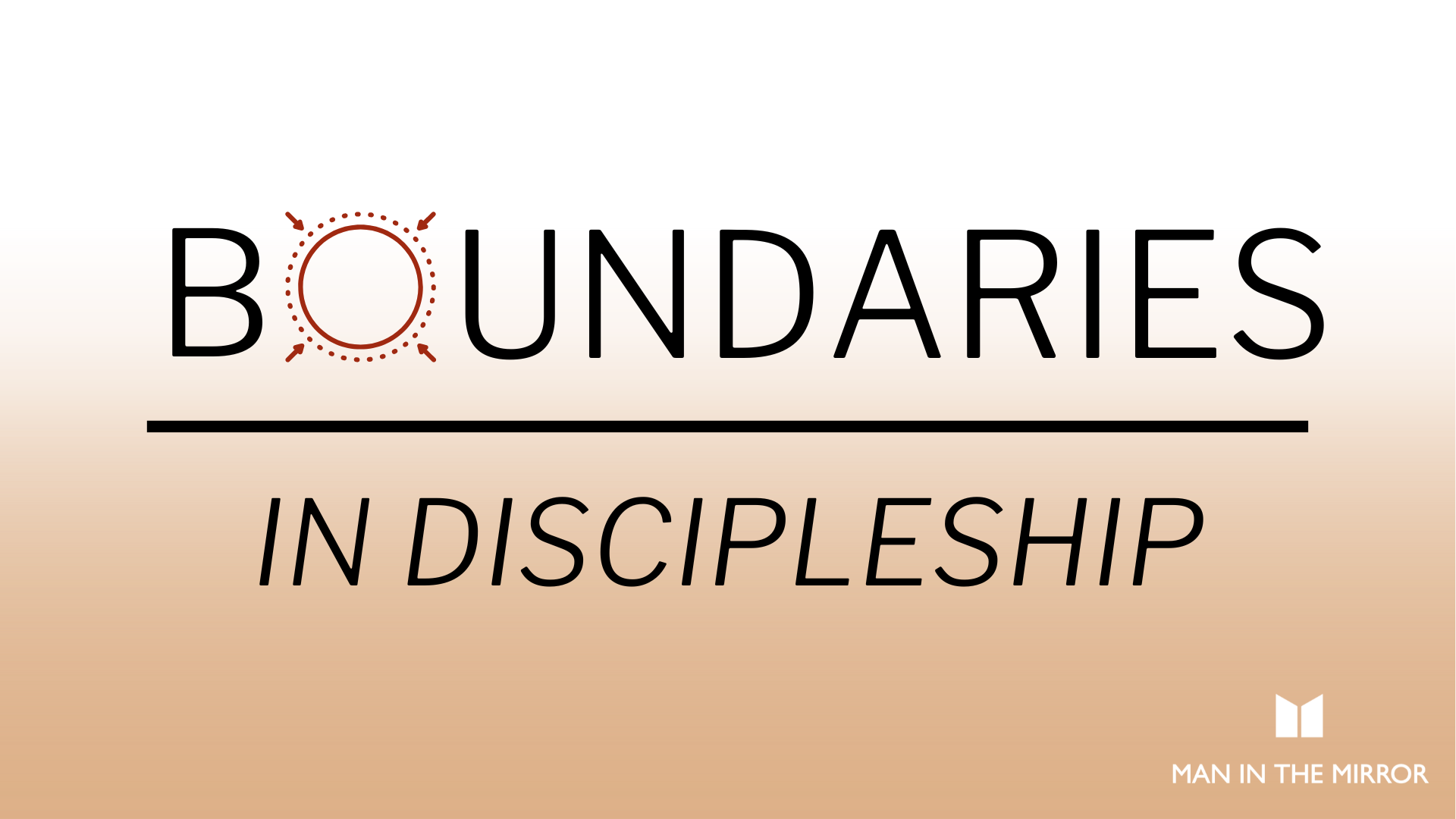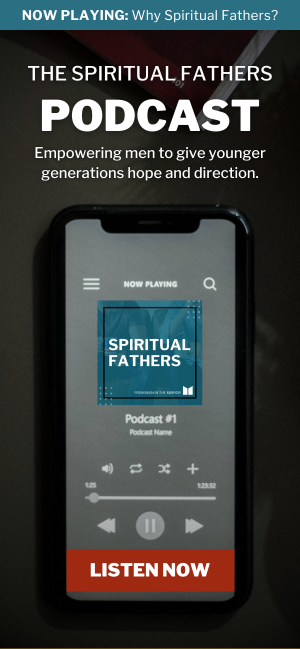Boundaries in Discipleship
We don’t often talk about setting boundaries in discipleship relationships. At first glance, the concept may seem foreign or even uncharitable. But if we want to build meaningful relationships that last and bear fruit, good boundaries are essential.

By the Man in the Mirror Team
If you’re guiding another man in a discipleship relationship, it’s important to make sure that the relationship you’re building is a healthy one, particularly if it takes on a spiritual father-son dynamic. To do that, you should consider and then set clear boundaries. Any discipleship relationship that doesn’t is likely to suffer—or even end in hurt or disaster.
Good boundaries build good trust. All our relationships—whether with our spouse, children, friends, colleagues, or neighbors—include boundaries—both spoken and unspoken.
The Basics
First, what do we mean by boundary? A boundary is any rule or space we create to maintain our own identity and well-being.
A boundary is any rule or space we create to maintain our own identity and well-being.Click To TweetBoundaries protect a person from harm, control, or manipulation. A boundary serves as a line between two people, delineating how much power you allow someone to have over you, and how much power you have over that person.
As a child of God, you are His workmanship and created in His image. No one has been granted the right to manipulate you or make unhealthy demands on you, or to require of you more than God has required of you.
Even more importantly, having good boundaries will remind you of your role in the life of a spiritual son or younger brother. You are not God, and you have not been given the job to behave as if you are. Setting and keeping healthy boundaries will help you maintain your rightful place in his life as a spiritual father who is dependent on your Heavenly Father.
Of course, boundaries can be flexible. You may have a few that are set in stone, but it’s natural for boundaries to need fine tuning over time, depending on the circumstances.
You are not God, and you have not been given the job to behave as if you are. Setting and keeping healthy boundaries will help you maintain your rightful place in his life as a spiritual father who is dependent on your Heavenly Father.Click To TweetThe purpose for having boundaries is not to isolate yourself or create a sense of division between you and the man you’re discipling. Rather, it’s to maintain your peace while also serving and investing in someone else.
Types of Boundaries
Boundaries can be physical, emotional, or spiritual.
Physical Boundaries
Physical boundaries are literally about the space around our bodies. Some of these boundaries are obvious.
For instance, no matter how angry anyone becomes, there can never be any violence or threat of violence.
It’s rarely a problem that men need extensive physical boundaries when it comes to affection. If anything, men need to increase the amount of physical affection they show each other. You don’t have to greet each other with a holy kiss (Romans 16:16), but hugs and pats on the back are certainly appropriate.
We do suggest you think about the role of physical boundaries in two key areas: in terms of your family and in terms of personal space or property. For example, if you have a family, your primary job as a husband and father is to care for yourself and your family well. This might look like reminding the man you’re discipling that you are not available around the clock. Or if you’re meeting up regularly for a meal or an activity, it might look like discussing financial arrangements, such as budget and who is paying. A misunderstanding in this area has the potential to be uncomfortable or embarrassing for both of you.
Emotional Boundaries
When most people today discuss boundaries, they mean emotional boundaries.
Emotional boundaries might seem complicated, but they are actually pretty simple:
- Don’t allow anyone to manipulate you using your or their emotions.
- Don’t manipulate anyone else using your or their emotions.
- Don’t take responsibility for someone else’s emotions.
While easy to understand at face value, emotional boundaries are tougher to set and keep. Consider the sense of discomfort we feel when someone tries to guilt trip us; this is often our internal sense of a need for a boundary there. A good emotional boundary recognizes, You may want me to do something, but you do not have the power to make me feel guilty if I don’t.
Refusing to take responsibility for someone else’s emotions also keeps you from falling prey to the idea that you are the only thing keeping someone else together, or the only person capable of helping or even “saving” them. Such ideas often develop in a season of crisis or struggle. But they result in an unhealthy distortion of the discipleship relationship.
Spiritual Boundaries
Spiritual boundaries involve our faith and our role as a spiritual guide to someone less experienced and mature.
One way to keep your spiritual boundaries is by not sacrificing your biblical views for the sake of harmony. But we need a clear distinction between essentials and non-essentials here. On the non-essentials, you can be at perfect peace with men if you have different opinions or are uncertain about what they believe on that issue. Arguments over the mode of baptism or the best form of worship music, for example, are unlikely to be fruitful (see 2 Timothy 2:23-24). But on the essentials of the faith, we maintain our boundaries by being clear what our convictions are.
That doesn’t mean providing a theological lecture. In fact, for young men especially, this is the last thing they need. Rather, what he needs is love and mentoring based on the convictions of your faith.
This is why it’s critical to maintain a correct view of our spiritual role in the lives of others. We are not given authority to dictate, demand, or force our opinions onto other men. To force any beliefs onto someone else is spiritual abuse. Our role is to encourage, support, and admonish.
To force any beliefs onto someone else is spiritual abuse.Click To TweetRemember the guide analogy we wrote about previously on the blog. When you’re discipling someone, you are with him on a journey. Maintain your convictions and allow him to have his as well. It is not your job to change his heart. That is the job of the Holy Spirit.
Prayerful Boundary Setting
What are some physical, emotional, and spiritual boundaries that are important to you in your relationships? Issues can arise when men go into a mentor relationship blind, having never thought about their boundaries before.
For example, if you are discipling someone who is in a season of crisis, suffering, or difficulty, it can be challenging to discern when it’s time to “bear one another’s burdens” or encourage him to “bear his own load” (Galatians 6:2,5). This is why it’s critical to pray through this process and ask God to give you discernment and wisdom.
And if you’re asking God to show you who you can build a meaningful discipleship relationship with, we recommend that you prayerfully establish your boundaries now, before you begin. This will empower you to express yourself clearly when needed and set the pace of the relationship from the start.
Discipleship relationships are God’s design for changing lives and building His kingdom. Let’s make sure they are healthy and built to last.
THE BIG IDEA: Healthy boundaries in discipleship relationships lead to lasting growth and connection.
This article was adapted from A Guidebook for Spiritual Fathers, Beta Version, 2022.
♦♦♦







